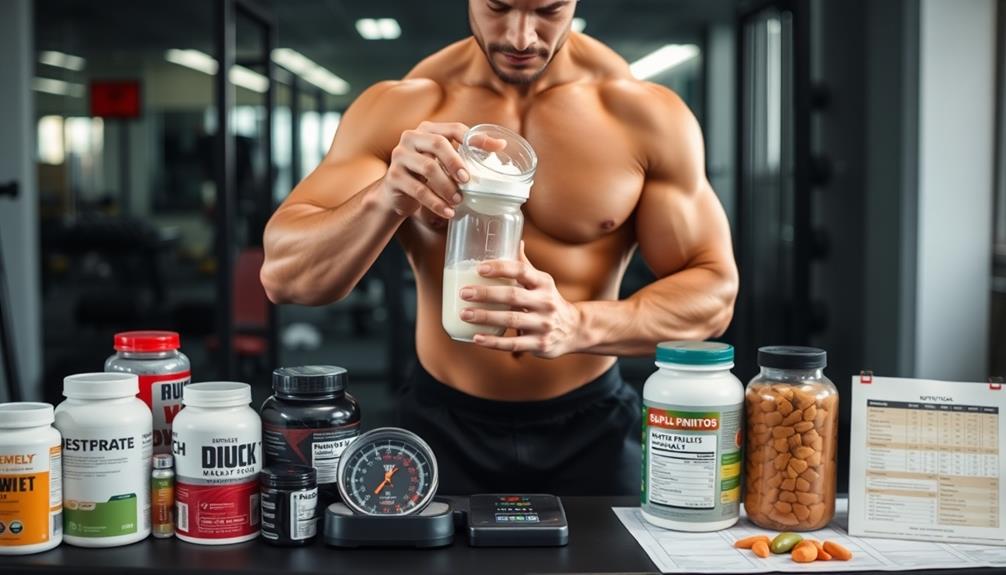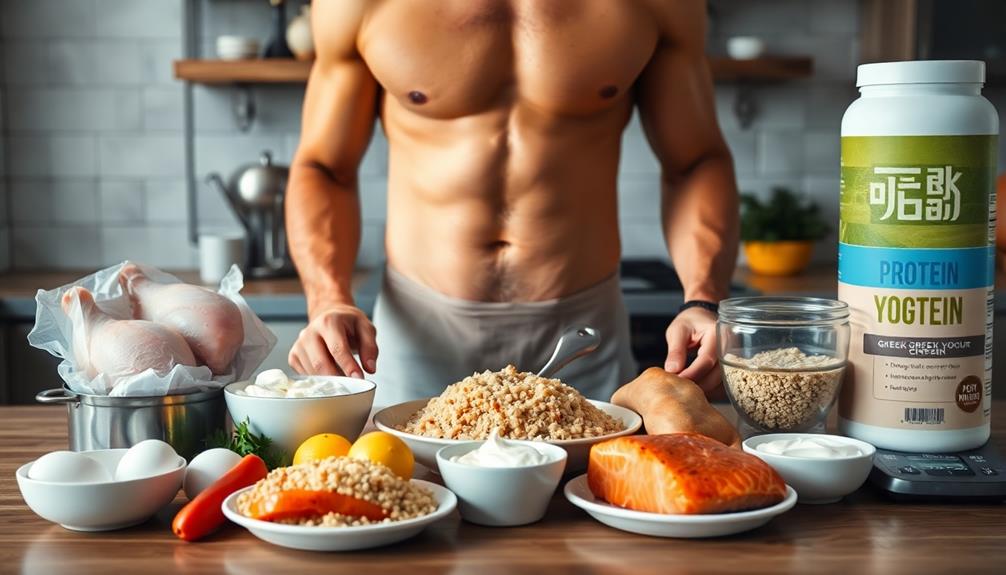To master bulking protein intake, you'll need to understand its role in muscle growth and calculate your individual requirements. Aim for 1.6 to 2.2 grams of protein per kilogram of body weight daily, spread evenly across meals. Focus on high-quality sources like chicken, fish, and eggs, supplementing with whey or casein protein as needed. Time your intake strategically, consuming protein before and after workouts, as well as before bed. Consistency is key, so incorporate protein into every meal and snack. By following these guidelines and adjusting as you progress, you'll optimize your muscle-building potential and achieve your bulking goals.
Core Insight
- Aim for 1.6 to 2.2 grams of protein per kilogram of body weight daily for optimal muscle growth during bulking.
- Consume high-quality protein sources containing all essential amino acids, such as chicken, fish, eggs, and whey protein.
- Distribute protein intake evenly throughout the day, including before and after workouts, to maximize muscle protein synthesis.
- Supplement with casein protein before bed to support muscle recovery and growth during sleep.
- Regularly reassess and adjust protein intake based on progress, body composition changes, and evolving fitness goals.
Understanding Protein's Role in Bulking

Protein plays a key role in building muscle, making it essential for bulking up successfully. When you're trying to gain muscle, protein gives your body the building blocks it needs to repair and build new muscle. It's not just about eating more protein, but choosing high-quality sources that contain all the essential amino acids. This is crucial for optimal muscle growth.
During a bulk, your body is primed to build muscle. Protein intake supports this by triggering muscle protein synthesis. You'll need to eat more protein than usual to maximize muscle gains and recovery. However, it's important to also eat enough carbs and fats for the best results.
Calculating Your Protein Requirements

Determining how much protein you need for bulking depends on a few key factors, like your body weight, how active you are, the intensity of your workouts, and your specific fitness goals.
A good starting point is to aim for 1.6 to 2.2 grams of protein per kilogram of body weight each day. If you're very active or doing intense weight training, you may need to bump that up to the higher end.
Anabolic supplements can be a good option if you're looking for alternatives to regular protein sources. They can give you an extra boost for muscle growth and recovery.
Make sure to spread your protein intake out evenly over the day. This helps maximize muscle protein synthesis. As your body changes during bulking, don't forget to reassess your protein needs from time to time.
Optimal Protein Timing Strategies

Strategic protein intake throughout the day can boost muscle growth and recovery. Focus on eating protein before your workout, after training, and before bed for the best results.
Pre-workout: Eat a high-protein meal 1-2 hours before exercising to fuel and protect your muscles.
Post-workout: Have a protein shake or meal within 30 minutes after your workout. This kick-starts muscle repair and growth.
Before bed: Consume 20-30 grams of slow-digesting casein protein about an hour before sleep. This feeds your muscles for hours as you rest.
Spread your remaining daily protein evenly across your other meals. This keeps a steady supply of amino acids available for your body.
Best Protein Sources for Bulking

Protein is key for building muscle when you're bulking. You want complete proteins with all the essential amino acids. The best sources are:
- Chicken, turkey, and lean beef
- Fish like salmon, tuna, and tilapia
- Eggs and egg whites
- Greek yogurt and cottage cheese
Grass-fed whey protein supplements can also help you meet your goals. They have extra benefits like omega-3s and CLA.
These proteins give you the most bang for your buck. They help with muscle growth without adding too much fat. Don't forget about plant proteins like beans, quinoa, and tofu. Mix it up to get a variety of nutrients.
The most important thing is being consistent. Make sure to include protein in all your meals. That's how you'll reach your bulking goals.
Supplementation and Advanced Techniques

Supplements and advanced techniques can help you bulk up even more. Whole foods should be your main protein source, but supplements can fill in the gaps. Plant-based dieters can try vegan pre-workout supplements for an extra boost. Consider adding whey protein powder after workouts and casein protein before bed.
Advanced techniques include timing your protein intake and cycling between high and low protein days. Try to eat protein every 3-4 hours to keep your muscles growing. Track your macros and adjust your protein based on your progress and goals.
Frequently Asked Questions
Can I Bulk Effectively on a Vegetarian or Vegan Diet?
Yes, you can bulk effectively on a vegetarian or vegan diet. Focus on protein-rich plant sources like legumes, tofu, seitan, and quinoa. Combine these with complex carbs and healthy fats. You'll need to plan carefully to meet your calorie goals.
How Do I Manage Protein Intake While Traveling or Eating Out?
When you're traveling or eating out, plan ahead. Choose protein-rich menu items, pack protein bars or powder, and don't shy away from asking for substitutions. You can also use apps to track your intake and find protein-friendly restaurants nearby.
Are There Any Risks Associated With Consuming Too Much Protein?
Yes, there are risks of consuming too much protein. You'll strain your kidneys, potentially gain unwanted weight, and might experience digestive issues. It can also lead to dehydration and increased risk of heart disease over time.
How Can I Increase Protein Absorption and Utilization in My Body?
To boost protein absorption and utilization, you'll want to pair proteins with carbs, eat protein throughout the day, and include enzymes in your diet. Don't forget to stay hydrated and consider adding probiotics to your routine.
What's the Best Way to Track My Daily Protein Intake Accurately?
You can track your daily protein intake accurately by using a food-tracking app or keeping a detailed food diary. Measure portions, check nutrition labels, and log everything you eat. Don't forget to include protein from snacks and beverages.

